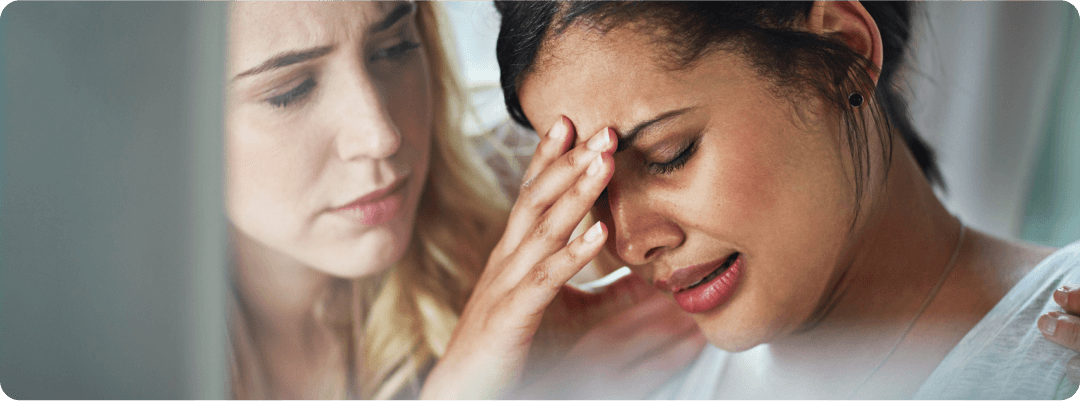Starting recovery from substance abuse or mental health issues takes a lot of time and dedication. There is no quick and easy way to escape the grasp of addiction or overcome mental health challenges. The process can be a long road, full of challenges and difficulties. Recovery and clinical treatment are processes that take patients through several levels of care before they have mastered the tools they need for a successful, healthy lifestyle.

The Steps to Starting Your Road to Recovery
The clinical journey portion of the road to recovery takes several steps. For those with substance abuse issues, you may first need to detox from the substances you were taking. For both substance abuse and mental health treatment, residential care is often the next step and sets you up for success.
A partial hospitalization program builds on the success and breakthroughs in residential treatment and keeps the forward momentum developed there going to help you continue to heal.
Intensive outpatient care helps you continue to build on your therapeutic success and helps start to rejoin your community. General outpatient helps you maintain your success.
Our dedicated staff here at Silver Linings Recovery Center is here to help you successfully transition through each level of care while you start to build your new healthy lifestyle.
The Detox Process
Detoxification is a crucial first step in addiction treatment. Many clinics offer Medication-Assisted Treatment (MAT) to help manage withdrawal symptoms as your body eliminates substances like drugs and alcohol.
MAT involves using carefully prescribed medications to ease the transition away from addictive substances. While detoxification can still be challenging, MAT often makes the process more tolerable. Whether or not MAT is employed, detox remains an essential component of the recovery journey.
Residential Treatment Program
Residential treatment plays a crucial role in addressing severe addiction disorders and mental health issues. This intensive approach involves clients living at the treatment facility, where they engage in various therapies throughout the day, including group sessions, art therapy, and one-on-one counseling. The controlled environment provides a safe space at night, free from external triggers and stressors.
This treatment option is particularly beneficial for individuals who lack a secure living situation near their chosen facility or are hesitant to return to their current environment. In a safe space away from triggers, patients can begin to heal. Residential programs offer a protected setting where clients can begin their journey without immediate external pressures.
Partial Hospital Program (PHP)
A Partial Hospitalization Program (PHP) is an intensive form of outpatient treatment that serves as a middle ground between residential treatment and standard outpatient care. It can be a step down from residential treatment or sometimes the first step in addressing both addiction and mental health issues. During a PHP, individuals participate in comprehensive treatment during the day but return home each evening.
Therapy in a PHP typically runs for 6-8 hours a day, 5-6 days a week. The program incorporates many of the same evidence-based therapies used in residential treatment, including:
- Individual therapy
- Group therapy
- Family therapy
- Art therapy
- Recreation therapy
- Cognitive Behavioral Therapy (CBT)
- Dialectical Behavior Therapy (DBT)
- Medication management (for both addiction and mental health)
- Psychoeducation on addiction and mental health
PHP offers several benefits for those seeking treatment for addiction and/or mental health issues:
- Flexibility: Participants can start reintegrating into their daily lives while still receiving intensive support.
- Family responsibilities: It allows time to care for young children or other vulnerable loved ones.
- Community reintegration: Individuals can gradually ease back into their community, applying newly learned skills in real-world situations.
- Practical application: Strategies learned in family therapy and other treatment components can be immediately put into practice at home.
- Cost-effective: PHP is often more affordable than residential treatment while still providing intensive care.
- Dual focus: It allows for simultaneous treatment of both addiction and mental health issues, addressing the complex interplay between these conditions.
This level of care is particularly beneficial for those who need more support than traditional outpatient services but don’t require 24-hour supervision. It provides a structured environment during the day while allowing individuals to practice recovery skills in their home environment each evening.
A Partial Hospitalization Program (PHP) is an intensive form of outpatient treatment that serves as a middle ground between residential treatment and standard outpatient care. It can be a step down from residential treatment or sometimes the first step in addressing both addiction and mental health issues. During a PHP, individuals participate in comprehensive treatment during the day but return home each evening.
Therapy in a PHP typically runs for 6-8 hours a day, 5-6 days a week. The program incorporates many of the same evidence-based therapies used in residential treatment, including:
- Individual therapy
- Group therapy
- Family therapy
- Art therapy
- Recreation therapy
- Cognitive Behavioral Therapy (CBT)
- Dialectical Behavior Therapy (DBT)
- Medication management (for both addiction and mental health)
- Psychoeducation on addiction and mental health

Intensive Outpatient Programming
An Intensive Outpatient Program (IOP) is a step down from a Partial Hospitalization Program (PHP), offering a flexible yet structured approach to treating both addiction and mental health issues. IOP therapy typically occurs 3-4 days a week for 2-3 hours a day, allowing clients to balance treatment with daily responsibilities.
IOP includes:
Community Reintegration: A primary focus of IOP is helping clients smoothly transition back into their community while maintaining their recovery progress. This gradual reintegration allows individuals to apply newly learned coping skills in real-world situations.
Continued Recovery Work: Clients in an IOP continue to work on their addiction recovery and mental health management. This includes ongoing therapy, skill-building, and addressing co-occurring disorders.
Increased Flexibility: IOP allows clients to resume jobs, care for family members, and engage more fully in their community and family lives. This balance helps clients practice recovery skills in their daily environment.
Comprehensive Treatment Options: IOP patients have access to a wide range of treatment modalities, similar to those offered in more intensive levels of care. These may include:
- Individual therapy
- Group therapy
- Family therapy
- Cognitive Behavioral Therapy (CBT)
- Dialectical Behavior Therapy (DBT)
- Medication management for both addiction and mental health issues
- Psychoeducation on addiction and mental health
- Relapse prevention techniques
- Stress management and coping skills training
Medication-Assisted Treatment (MAT): For those dealing with substance use disorders, MAT remains available in IOP. This can be utilized for short-term, long-term, or lifetime use, depending on the individual’s needs and medical advice.
Mental Health Support: For those primarily dealing with mental health issues, IOP provides ongoing therapy, skill-building sessions, and medication management as needed.
This level of care is ideal for individuals who have a stable living environment and have made significant progress in more intensive treatment settings, but still require substantial support as they navigate the challenges of early recovery and mental health management.
General Outpatient Programming
After completing the Intensive Outpatient Program (IOP), clients may transition to a general outpatient program that addresses both substance abuse and mental health concerns. This phase of treatment focuses on continuing clinical care for dual diagnosis issues. Clients typically attend 1-2 group sessions per week, which cover topics related to addiction recovery and mental health management. Additionally, individual therapy sessions are provided to address personal challenges and reinforce coping strategies.
During this general outpatient phase, treatment goals include:
- Maintaining sobriety and managing mental health symptoms
- Strengthening relapse prevention skills for both substance use and mental health issues
- Developing a support network within the community
- Addressing any co-occurring disorders or trauma
- Improving overall well-being and life skills
As clients progress through the general outpatient program, they gradually reintegrate into their community and family lives. This transition allows them to apply the skills learned in treatment to real-world situations while still receiving professional support. Upon completing the general outpatient program, clients should have a solid foundation for long-term recovery from both substance abuse and mental health challenges.
Other Programs
Aftercare
Aftercare is provided for both our substance abuse and mental health treatment programs. Aftercare includes optional programs such as recreational activities, continued support groups, and periodic check-ins. These activities help graduates of the program make new friends, engage in new hobbies, and maintain their progress in recovery.
Treatment for Co-Occurring Disorder
Often, those on the path to addiction also suffer from trauma and/or another mental health condition. Conversely, those with mental health issues may develop substance abuse problems. When someone suffers from at least one mental health disorder as well as an addiction disorder, they are suffering from a condition called "co-occurring disorders" or a "dual diagnosis". Our clinic is equipped to help people with co-occurring disorders. We provide comprehensive assessments to ensure that all aspects of a patient's health are addressed in their treatment plan.
Medication Management
During periods of intense craving, the urge to misuse prescription drugs can be overwhelming, even for medications properly prescribed by a physician. Medication management provides essential guidance on the correct use of these medications, helping you develop strategies to resist misuse and maintain your recovery journey. This process equips you with the knowledge and tools to use prescribed drugs safely and effectively, reducing the risk of substance abuse relapse.
Medication Management
Learning to manage medication appropriately is a central focus in PHPs. Individuals receive guidance on proper usage and strategies to avoid the temptation of misuse. This comprehensive approach not only educates on medication but also empowers individuals to navigate situations where taking medication might pose challenges.
Mental Health Treatment
In addition to our substance abuse treatment programs, we now offer specialized care for various mental health disorders, including:
- Depression
- Anxiety disorders
- Bipolar disorder
- Post-traumatic stress disorder (PTSD)
- Obsessive-compulsive disorder (OCD)
- Eating disorders
- Schizophrenia
- Personality disorders
Our mental health treatment incorporates evidence-based therapies, medication management when necessary, and holistic approaches to support overall well-being.
Comprehensive Addiction and Mental Health Treatment
At Silver Linings Recovery Center, we understand that recovery can be challenging, whether you’re dealing with addiction, mental health issues, or both. Our expanded treatment programs are designed to support you on your journey to wellness, addressing both substance use disorders and mental health conditions.
Our Therapy Approaches:
Cognitive Behavioral Therapy (CBT)
CBT is a short-term, solution-focused approach that helps you develop positive thought patterns and behaviors. This therapy is effective for both addiction and various mental health disorders, providing you with long-lasting strategies for managing your challenges.
Individual Therapy
In one-on-one sessions with our experienced therapists, you’ll have a safe space to explore your experiences related to addiction or mental health. These confidential sessions allow for personalized treatment tailored to your specific needs.
Group Therapy
Our group sessions foster a sense of community and shared experience. Whether you’re dealing with substance abuse or mental health issues, you’ll find support and understanding from peers facing similar challenges. Participation is encouraged but not mandatory.
Family Therapy
We recognize that both addiction and mental health disorders affect the entire family unit. Our family therapy sessions aim to heal relationships, improve communication, and help loved ones understand the complexities of your journey.
Ongoing Support and Recovery Meetings
We provide information on a variety of support groups, including:
- Substance abuse recovery meetings (AA, NA, SMART Recovery)
- Mental health support groups (for depression, anxiety, bipolar disorder, and other conditions)
These meetings offer continued support and community connection as you maintain your recovery and manage your mental health.

Taking the Next Step
If you’re ready to address your addiction or mental health concerns, Silver Linings Recovery Center is here to help. Our comprehensive approach ensures that we can support you, whether you’re dealing with substance abuse, mental health issues, or both.
Our dedicated team is committed to helping you achieve long-term recovery and improved mental wellness. We offer various levels of care to meet your specific needs.
Contact our admissions department today to learn more about our programs and how we can support your journey to a healthier, more fulfilling life. Remember, seeking help is a sign of strength, and we’re here to guide you every step of the way.